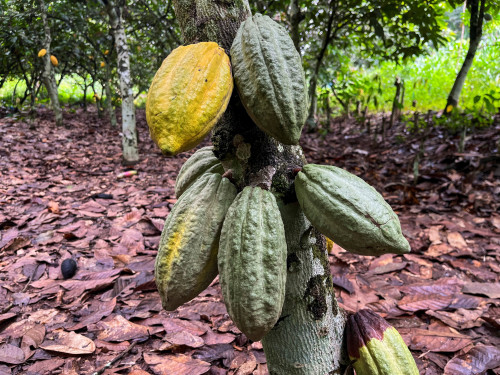LONDON (Reuters) – World cocoa, coffee and sugar prices slid again on Friday as markets remained rattled by U.S. president Donald Trump’s sweeping ‘Liberation Day’ tariffs, especially after China retaliated with its own tariffs on U.S. imports.
Trump on Wednesday slapped a 10% tariff on most U.S. imports and much higher levies of more than 50% on some counties, prompting a world-wide sell of in stock markets as nations from Canada to China ready retaliation.
“Following this ‘liberation’, many trade flows from the most affected producers will now enter a labyrinth in order to find demand in other countries,” said Rabobank in a report that warned the new demand will come ‘at an efficiency cost’.
The bank also said that as ‘retaliation day’ looms, U.S. consumers of coffee and chocolate should expect more expensive products as top cocoa producer Ivory Coast faces a 21% tariff while No. 2 coffee producer Vietnam faces a ‘humbling’ 46% levy.
At 1228 GMT, London cocoa futures traded on the ICE exchange, seen as a global price benchmark, traded down 1.1% to 6,611 pounds per metric ton, having lost 1.5% on Thursday, while New York cocoa fell 2.7% to $9,044 a ton.
Aside from consuming the most chocolate, the U.S. is also the world’s top importer of processed cocoa products like butter from the European Union, Malaysia and Indonesia, which now face tariffs of 20%, 24% and 32%, respectively.
While tariffs could hurt U.S. chocolate demand, dealers noted that losses in cocoa prices are somewhat limited by supply concerns, with top producer Ivory Coast expected to record its worst mid-crop in a decade.
Arabica coffee futures, by contrast, slid 3% to $3.7395 per lb, having lost 1% on Thursday, while robusta coffee fell 3% to $5,228 a ton.
The first U.S. tariffs on coffee imports since colonial times will increase costs and complexity to American importers and roasters already struggling to pass on near-record coffee prices, dealers said.
Top global robusta producer Vietnam, facing 46% tariffs, is the third largest supplier of coffee to the U.S., which is in turn the biggest consumer of the caffeinated beverage in the world.
“If applied, the new tariffs could spell the end of Vietnam coffee in the U.S. as it would create significant price gaps with competing robusta origins – a massive 36-percentage-point difference (~$1,944/ton) compared with Brazil,” said a dealer.
In other soft commodities traded, raw sugar fell 0.6% to 19 cents per lb, having closed down 2.5% on Thursday, while white sugar fell 0.4% at $541.80 a ton, having lost 1.6% in the prior session.
(Reporting by May Angel; editing by David Evans)


